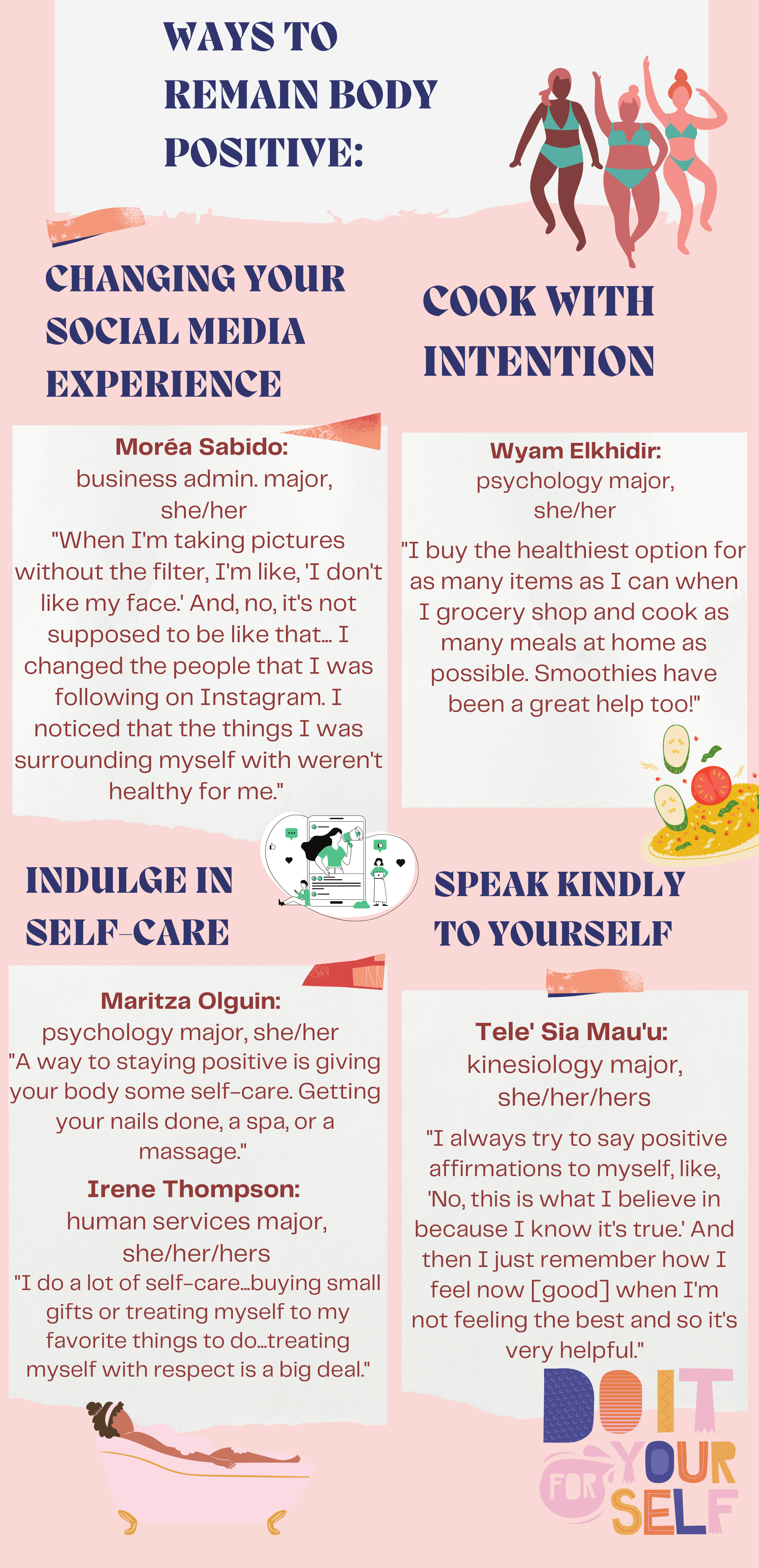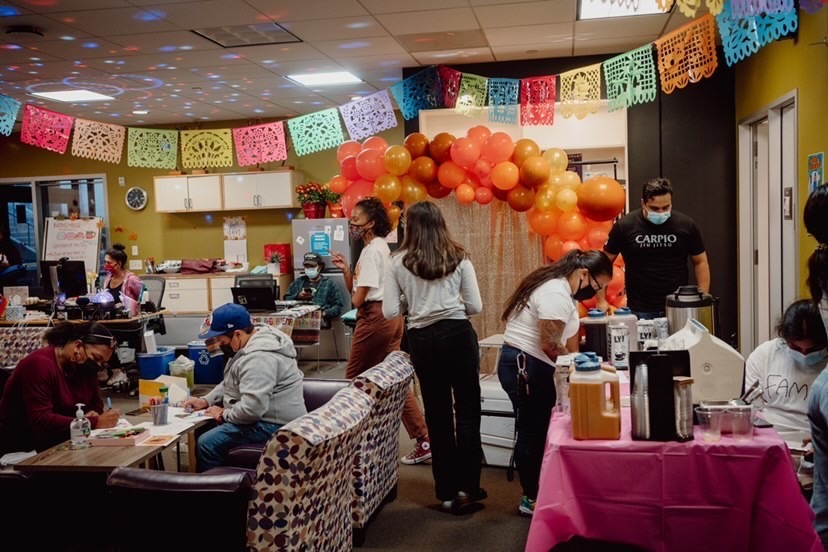Though the WRC focuses mainly on women, it is open to all students, alumni, and staff of any and all genders interested. Photo courtesy of Moréa Sabido
By Serena Sanchez, Staff Reporter
With Thanksgiving just passing and Christmas on the horizon, most people might be counting the days until they get to feast upon an enormous meal with their family. But for some, sitting side by side with relatives, as they share a hot holiday meal, can be triggering and uncomfortable.
Individuals who are on their body-positivity journey can often find holidays difficult. Dinners can become uncomfortable when comparisons become too much to bear or side comments are made. Comments like these that are often brought up at a family dinner, can have much more effect than we realize and can set back all the work one has done to remain body positive.
Body positivity is rooted in loving one’s body and gaining self-confidence. Although body positivity is thought to be an individual journey, which centers on loving yourself the way you are, communal and outside support makes one’s journey much easier. Accepting others, regardless of race, gender, and weight is an essential part of being in a community.

Being body positive has gained momentum throughout the years. Examples of this include the addition of plus-sized models into the industry, the growing erasure of stigmas involving gender, and the overall respect of those around us.
California State University, Dominguez Hills has also brought such a struggle to people’s attention through efforts by the Women’s Resource Center (WRC). The subject of body positivity and body liberation is not taken lightly by the WRC in the slightest.
According to Alyeska Gutierrez-Estrada, the WRC Coordinator, the WRC tries to incorporate body positivity into their events every time they can. “One of the things that we do is take a feminist lens and we [look] at the way society can impact a lot of people’s bodies, especially women’s bodies, especially queer bodies, can be in a very negative light,” said Gutierrez-Estrada.
Last month, the WRC and its GLOW (Growth & Leadership Opportunity for Women) interns hosted the Love & Liberation: A Body Positivity Fair. The colorful set-up, loving atmosphere, and buzzing energy–not just from the free coffee booth–and infectious laughter worked hand-in-hand to create the educating, as well as liberating, atmosphere.
While they might not talk about it, many CSUDH students are on the heavy journey that is reaching total body positivity and acceptance toward themselves. Art by Serena Sanchez
“It’s a safe space where we wanted to highlight celebrating and loving our bodies, but also thinking about the oppressive systems that actually cause us to think negative things about our bodies…and dismantling that within our own heads first,” said Moréa Sabido, a GLOW intern in her senior year.
Besides the real, physical aspects of the fair, the warm and trusting feeling within the room was almost tangible.
“I feel so important. I feel so loved here. I feel such a community. I may not know everyone’s name in that room, but I don’t need to, to feel that I’m cared about,” said Tele’sia Mau’u, a kinesiology major and guest at the event.
Media and outside perspectives often try to convince individuals they are not enough, which is why the importance of community was clear within the fair.
“I just want to remind folks that they are not alone in this, it’s just being able to seek out some support and some resources for whatever it is that they need,” said Gutierrez-Estrada.
There are numerous obstacles that make the path to full acceptance of ourselves immensely difficult, and one of these is the holidays. Whether you live on or off-campus, seeing family and being around copious amounts of food can bring troublesome results.
Even if you might be on a journey toward self-acceptance, family members may not always understand what that means or care. Side comments and suggestions, though they might be well-intentioned, are never helpful.
Yoselin Juarez, GLOW intern and psychology major, knows this feeling. Her family is Central American and from Guatemala, her holidays consist of tamales, among others, and celebrating multiple days of the year. She feels what isn’t really discussed is the unhelpful guidance family members try to give when it comes to one’s appearance.
“I’ve heard some family members being like, ‘Oh, don’t eat too much,’ or, ‘Be careful, you don’t want to go like, overweight,’ or ‘You’re eating in a way where it’s not controlled.’ I feel like they’re not giving people that moment of like, enjoying themselves in the holiday, especially after a stressful year,” Juarez said.
For many people like Juarez, eating at one table around people can change from being enjoyable to heartbreaking.
In Sabido’s experience, growing up in a Filipino household has had its struggles when it comes to food in general, which makes holidays a bit stress-inducing.
“The grandma’s always like, ‘You eat too much, or too little,’ or they always have something to say, and it’s like, I can’t ever get it, right. Like, I’ll never be perfect for them. So it’s like a lot of pressure to look or be a certain way,” Sabido said.
It’s important to remember that the holidays are a time to enjoy, so being able to block out unnecessary and unasked-for opinions about one’s body is crucial.
Wyam Elkhidir, a psychology major in her third year, reminds us that while this season can definitely be hard on some people’s mental and emotional health, prioritizing yourself for what you need is more important.
“The most liberating thing is knowing what’s best for yourself and staying true to that,” Elkhidir stressed. “The process is not linear, but progress is inevitable once you take that first step towards self-love.”
No matter how hard outside perspectives push against the self-acceptance you have built for yourself, it is important to keep in mind, whether someone is family or not, that it is absolutely okay to push back.

